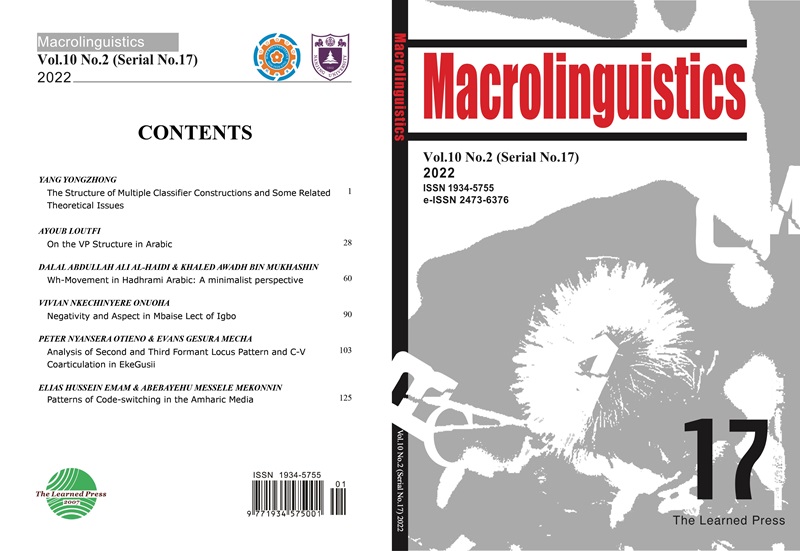Language of Open-Air Market in North-Central Nigeria
引用次数: 0
Abstract
Language plays a significant role in business, trade and commerce. Bargaining in open-air markets often involves the speech act of negotiating, compromising and manoeuvring, which could either result in conflict or persuasion of the potential buyer to patronize a seller. This article examined the sociolinguistic aspects of language use between sellers and buyers in Ipata, a popular market in Ilorin, north-central Nigeria. The call strategy, spiel, honorification, pragmatic mechanics as well as sociolinguistic style employed by vendors were observed. The objectives of the study were to: identify the number of languages used in Ipata market; investigate the factors that influence the choice of any of the languages used between sellers and buyers at a particular time; analyze their sociolinguistic and stylistic features; and discuss some of the barriers that could cause intercultural communication breakdown between sellers and buyers in a market situation.Oral interview, systematic observation and Bauman’s (2001) method of street recording were used to gather data for the study. Sixty-five people comprising thirty-six females and twenty-nine males were interviewed. The survey which spanned three months discovered that open-air markets bear some universal features, however, due to cultural relativity, variations occur. To this end, it was established that Ipata market harbours different languages; it also identified calls and spiels with their characteristic stylistic, sociolinguistic and discourse features in the market. In conclusion, the study argued that studying the verbal discourse of marketplaces is significant as it defines what the language-culture-society-relationship is all about.尼日利亚中北部露天市场的语言
语言在商业、贸易和商业中起着重要的作用。在露天市场讨价还价通常涉及谈判、妥协和操纵的言语行为,这可能导致冲突或说服潜在买家光顾卖家。这篇文章从社会语言学的角度研究了尼日利亚中北部伊洛林的一个热门市场——伊帕塔的买卖双方之间的语言使用情况。观察了供应商使用的呼叫策略、言语、敬语、语用机制以及社会语言风格。这项研究的目的是:确定伊帕塔语市场使用的语言数量;调查在特定时间影响卖方和买方之间使用的任何语言选择的因素;分析它们的社会语言学和文体特征;并讨论在市场情况下可能导致买卖双方跨文化沟通中断的一些障碍。采用口头访谈法、系统观察法和Bauman(2001)街头记录法收集研究数据。65人接受了采访,其中包括36名女性和29名男性。这项为期三个月的调查发现,露天市场具有一些普遍的特征,然而,由于文化相对性,差异也会发生。为此,确立了伊帕塔市场拥有不同的语言;本文还对市场中具有文体特征、社会语言学特征和语篇特征的叫法和叫法进行了分析。总之,该研究认为,研究市场的口头话语是重要的,因为它定义了语言-文化-社会-关系是什么。
本文章由计算机程序翻译,如有差异,请以英文原文为准。
求助全文
约1分钟内获得全文
求助全文
来源期刊
自引率
0.00%
发文量
83
审稿时长
20 weeks
期刊介绍:
Macrolinguistics (ISSN 1934-5755, e-ISSN 2473-6376) is an international academic journal which is specialized in research papers of non-Indo-European linguistics. It is published biannually by The Learned Press and funded by the Double First-Class Initiative of Nanjing University. It aims at contributing to the complementarity and interaction of linguistic research worldwide.

 求助内容:
求助内容: 应助结果提醒方式:
应助结果提醒方式:


